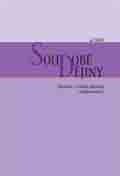O užitečnosti a neprospěchu pojmu totalitarismu při zpětném pohledu na starší koncepty
On the Advantages and Disadvantages of the Concept of Totalitarianism, with Earlier Approaches Taken into Account
Author(s): Bedřich LoewensteinSubject(s): History
Published by: AV ČR - Akademie věd České republiky - Ústav pro soudobé dějiny
Summary/Abstract: This article assesses Miloš Havelka’s hypothesis of a totalitarian era in Czech history from four different points of view. First it examines the use of the term ‘totalitarianism’ in post-war Czech political discourse. Among other things, the author points out that the term was used only rhetorically, polemically, and temporarily applied, particularly when someone or something was termed ‘Fascist.’ The second point concerns the prevalent contemporary conception of a totalitarian continuity in Czech society after the Munich crisis. In this context the author points out that émigré literature, as long as emotional strength is complemented by a degree of self-criticism, offers valuable insights. The third part examines the degree to which the concept of totalitarianism, which came to be accepted from the 1950s onwards, is applicable to Czech society. When applied to the 1950s, also taking into account the concept of a ‘political religion’, the answer is that it is indeed applicable. The last part of article takes a critical look at the attempts to de-totalize (de-Stalinize) society in the 1960s. In a digression, this part offers an interpretation of the efforts at research into the Fascism of this period, which reveal that an irrational animosity to civilization is common to both totalitarian systems.
Journal: Soudobé Dějiny
- Issue Year: XVI/2009
- Issue No: 04
- Page Range: 674-687
- Page Count: 14
- Language: Czech

